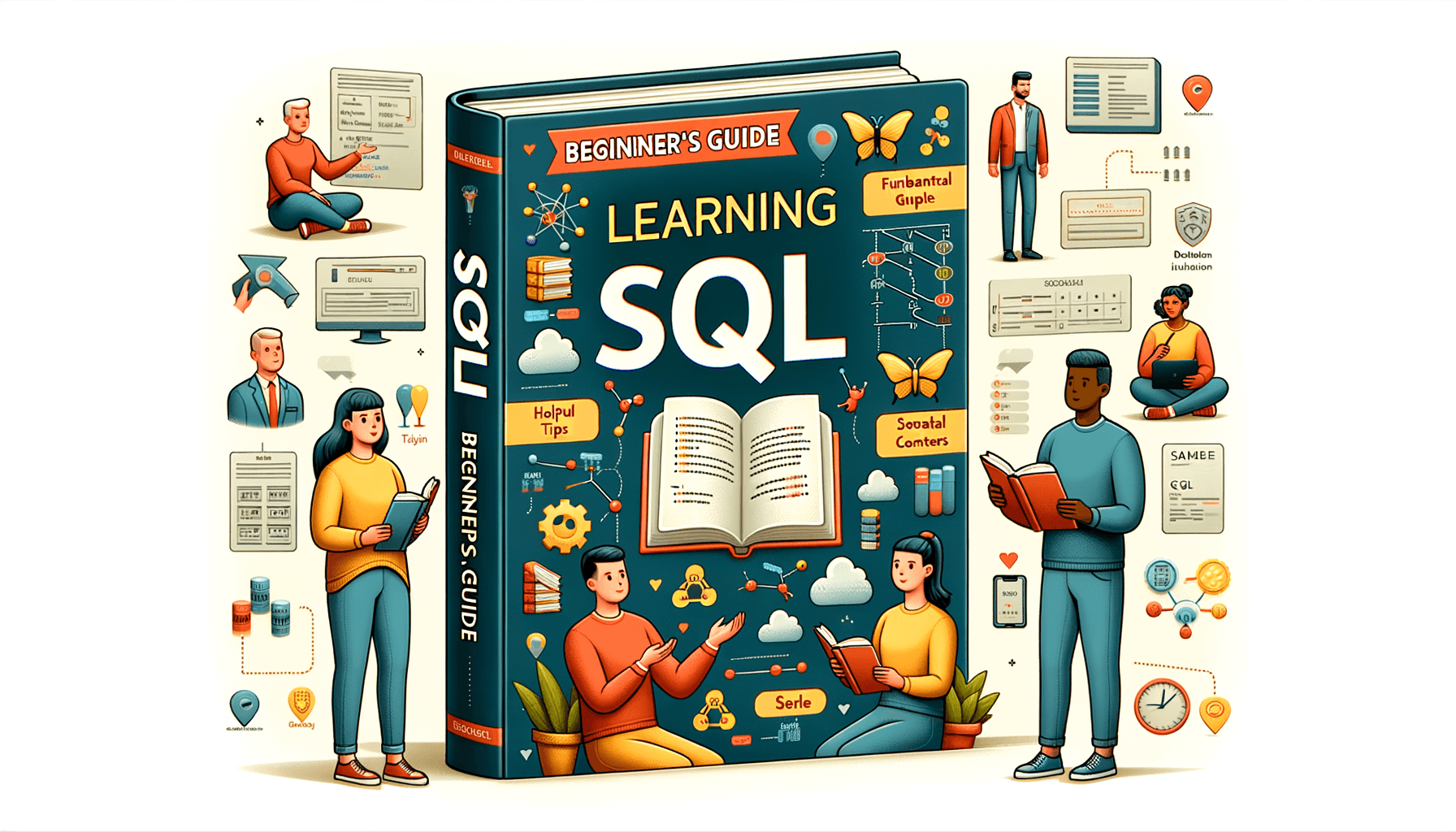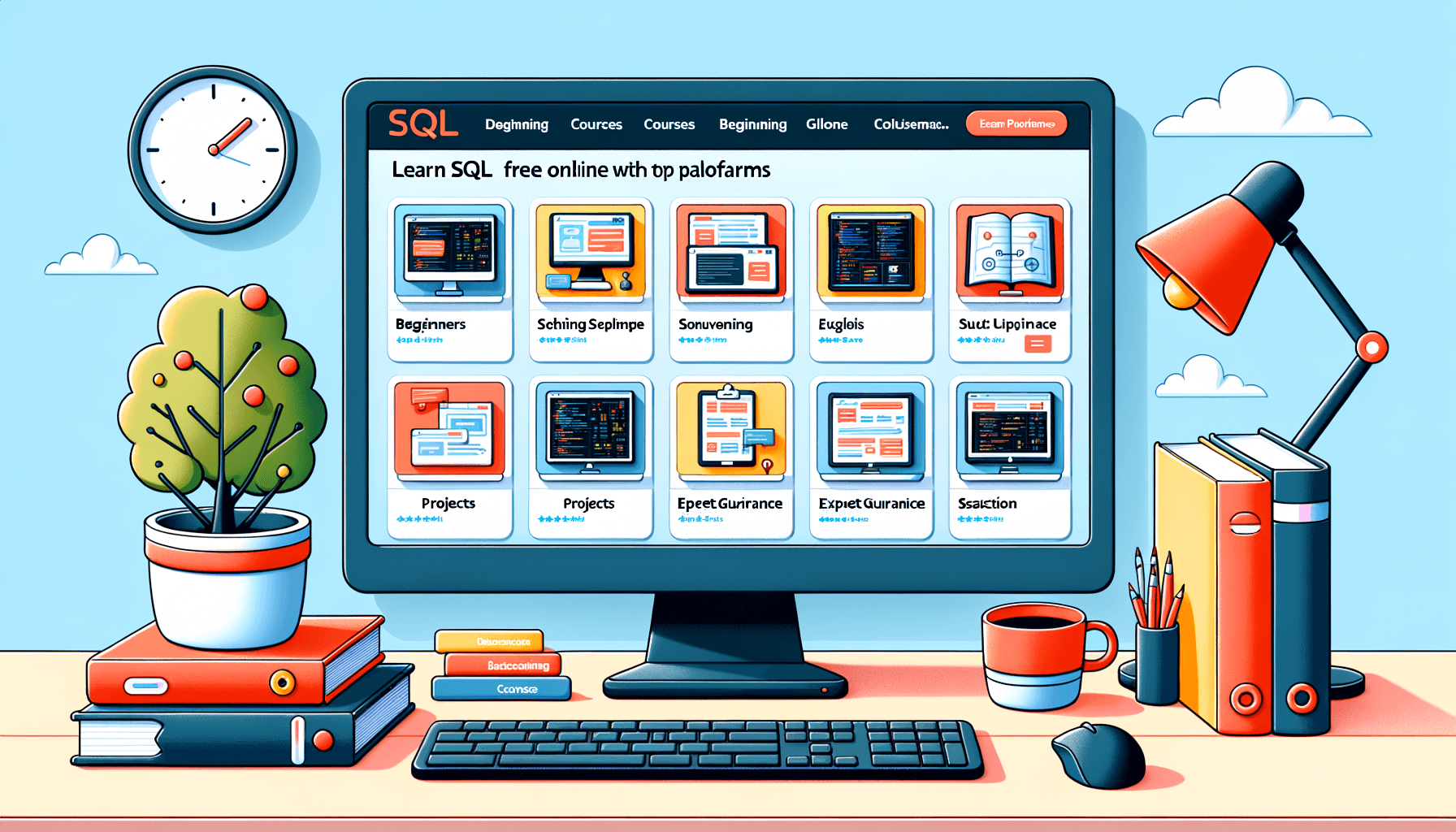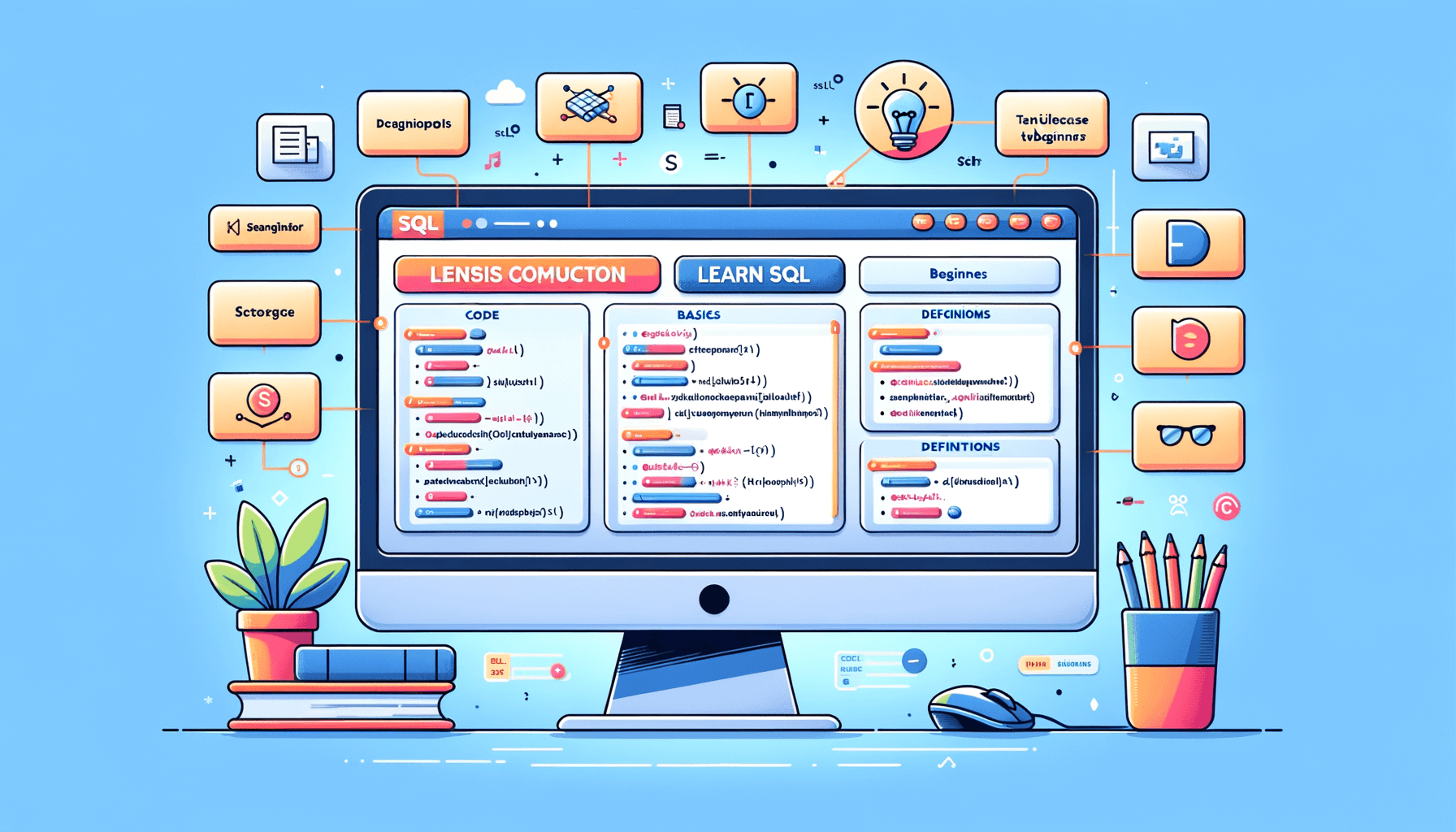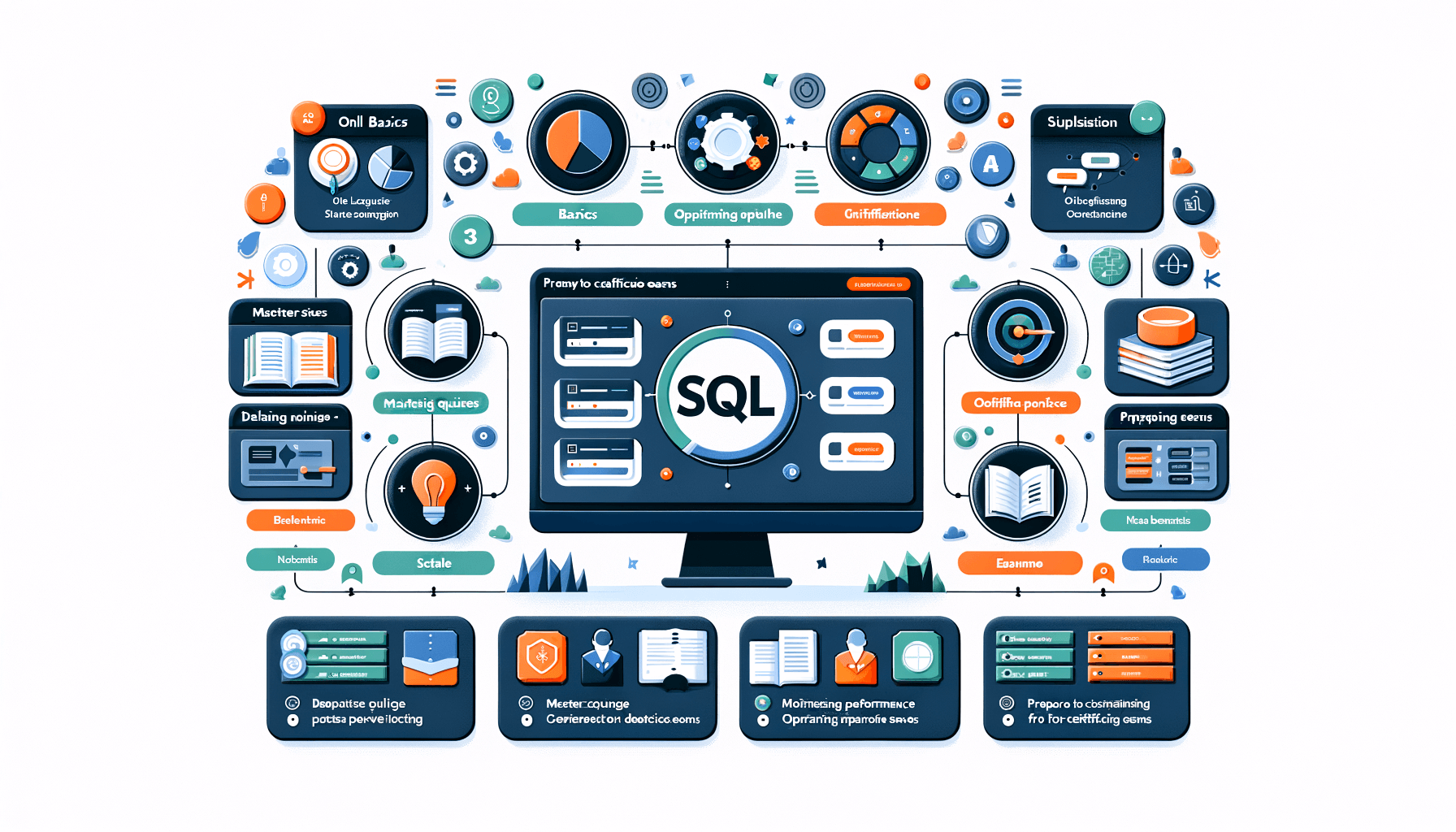A big variety of articles and resources

Is It Easy to Learn SQL? A Beginner's Guide to Mastering SQL
 Sia Author and Instructor
Learn SQL
Sia Author and Instructor
Learn SQL
10 minute read
Understanding SQL and Its Applications
What is SQL?
SQL (Structured Query Language) is a powerful tool used by computer science students and professionals to manage and retrieve data stored in relational databases. With its user-friendly syntax and vast capabilities, SQL is a must-have skill for anyone interested in a career in data analysis, software development, or database management. Anyone who works with data needs SQL knowledge, as it is widely used to communicate with relational databases across many fields and disciplines.
Common Uses of SQL
SQL has several useful applications for handling large volumes of data, such as adding, updating, or deleting records within a database, creating new databases, adding new tables to an existing database, creating views or stored procedures in a database, and establishing permissions on views, tables, and procedures. Its flexibility allows a SQL query to be written in various ways using English-based statements.
Industries That Rely on SQL
SQL is used by a wide range of professionals, from data analysts and data scientists to software developers and IT administrators. It's a language that transcends industries and job roles, making it an essential skill in today's data-driven world. The history of SQL is a fascinating journey that began in the 1970s, and its relevance has only grown over time.
Master SQL for beginners: essential concepts, practice with DBMS, data analysis, and online resources. Opportunities in data-driven world await.
Why SQL is Considered Beginner-Friendly
Straightforward Syntax
SQL is designed to be intuitive and straightforward, making it accessible to professionals from all fields. Its syntax is logical and easy to understand, which makes it a great starting point for anyone new to programming or data analysis. In fact, SQL is often the first language taught in many data analysis and computer science programs because of its simplicity and practicality.
Limited Command Set
Another thing that makes SQL beginner-friendly is its practicality. Unlike some programming languages that require you to learn a lot of theory before you can start building anything useful, SQL lets you start working with real data almost immediately. This makes the learning process much more engaging and rewarding. Plus, as you progress in your learning journey, you'll find that the concepts you struggled with initially will start to make more sense.
Logical Structure
If you're new to SQL or have no IT experience, don't worry. SQL is a user-friendly language that's designed to be intuitive and straightforward. In fact, many people have successfully learned SQL on their own, starting from scratch. And the best part? You don't need any special software or expensive textbooks to get started. All you need is a web browser, an internet connection, and a willingness to learn.
SQL can be learned by beginners with no programming experience. Its syntax is straightforward and logical, making it relatively easy to understand and implement.
Challenges You Might Face While Learning SQL
Abstract Nature of Databases
One of the initial hurdles in learning SQL is understanding the abstract nature of databases. Unlike other programming languages where you see immediate results, SQL requires you to think about data in a more conceptual way. This can be confusing for beginners who are not used to this kind of thinking.
Set-Based Thinking
SQL operates on sets of data, which is different from the procedural approach many are accustomed to. Mastering SQL learning involves shifting your mindset to think in terms of sets and relations rather than individual records. This can be a significant adjustment for those new to the language.
Common Mistakes Beginners Make
Beginners often make mistakes such as forgetting to use the correct syntax or misunderstanding how joins work. Here are some common pitfalls:
- Using incorrect SQL commands
- Misunderstanding joins and subqueries
- Not optimizing queries for performance
Don't worry if you find SQL to be challenging. Everyone's learning journey is different, and it's normal to encounter difficulties, especially if you're new to the world of programming.
Effective Strategies for Learning SQL
Structured Learning Paths
One of the best ways to learn SQL is by following a structured learning path. This approach ensures that you cover all the essential topics in a logical order, building a strong foundation before moving on to more advanced concepts. Break down complex queries into smaller parts to better understand their structure. This methodical approach can significantly accelerate your SQL learning for free.
Practical Exercises
Hands-on practice is key to mastering SQL. Explore freely available databases or create your own mock datasets to experiment with. As you tackle real-world challenges and solve practical problems, you'll gain confidence and proficiency in SQL. Interactive courses available online can provide a quick learning experience.
Utilizing Online Resources
The internet is filled with resources to help you learn SQL. From online courses to community forums, you can find answers to your questions and seek help when encountering difficulties. Utilize these resources to ask questions and seek help when encountering difficulties. This is one of the best ways to learn SQL for a beginner.
Learning SQL can be a valuable asset for various careers and fields. With abundant online resources, anyone can learn SQL conveniently. It's essential to approach learning SQL systematically by starting with the basics, practicing with real-world problems, and gradually building more complex projects.
Essential SQL Concepts to Master Early On
Basic SQL Commands
When starting with SQL, it's crucial to get familiar with the basic SQL commands. These include SELECT, INSERT, UPDATE, and DELETE. These commands form the foundation of most SQL operations and are essential for interacting with databases. As you progress, you'll encounter many more commands, but mastering these basics will give you a solid start.
Understanding Joins
Joins are a fundamental concept in SQL that allow you to combine data from multiple tables. There are several types of joins, including INNER JOIN, LEFT JOIN, RIGHT JOIN, and FULL JOIN. Understanding how to use these joins effectively will enable you to write more complex and efficient queries.
Working with Subqueries
Subqueries, or nested queries, are queries within queries. They can be used to perform more advanced data retrieval operations. For example, you might use a subquery to filter results based on a condition that involves another table. Mastering subqueries will significantly enhance your ability to handle complex data scenarios.
Hands-on practice is key to mastering SQL. Explore freely available databases or create your own mock datasets to experiment with. As you tackle real-world challenges and solve practical problems, you'll gain confidence and proficiency in SQL.
These are some good SQL beginner elements to learn, but of course you’ll encounter many more as you gain SQL proficiency!
Practical Applications of SQL Skills
Real-World Projects
Hands-on practice is key to mastering SQL. Explore freely available databases or create your own mock datasets to experiment with. As you tackle real-world challenges and solve practical problems, you'll gain confidence and proficiency in SQL.
Data Analysis
SQL proficiency also proves valuable in data warehousing, where extensive data from various sources is consolidated and organized for analysis. Beyond mastering basic SQL syntax and query writing, developers and data scientists may need to optimize queries for performance and work with advanced SQL features such as stored procedures, views, and triggers.
Database Management
Additionally, SQL has several useful applications for handling large volumes of data, such as adding, updating, or deleting records within a database, creating new databases, adding new tables to an existing database, creating views or stored procedures in a database, and establishing permissions on views, tables, and procedures.
SQL is a powerful tool that is widely used in the field of databases and computer science. It is a must-have skill for anyone interested in a career in data analysis, software development, or database management. With its user-friendly syntax and vast capabilities, SQL is a great starting point for anyone looking to learn more about working with databases.
Resources to Help You Learn SQL
Learning SQL can be a rewarding journey, especially with the right resources at your disposal. Here are some of the best ways to get started and advance your SQL skills.
Online Courses
Online courses are a popular and effective way to learn SQL language free. Platforms like Codecademy, Udemy, and Coursera offer comprehensive tutorials that cover everything from basic to advanced SQL concepts. These courses often include hands-on projects and expert guidance, making them ideal for beginners and advanced learners alike.
Books and Guides
Books and guides are excellent resources for those who prefer a more traditional learning approach. Some popular books include "SQL for Dummies" and "Learning SQL" by Alan Beaulieu. These books provide in-depth explanations and practical examples to help you master SQL skills.
Community Support
Community support can be invaluable when learning SQL. Online forums, social media groups, and local meetups offer opportunities to ask questions, share knowledge, and connect with other learners. Websites like Stack Overflow and Reddit have active SQL communities where you can find answers to your questions and learn from others' experiences.
Master SQL skills with hands-on projects and expert guidance. Start your journey to become a valuable asset in data-driven roles.
Unlock your potential with our comprehensive SQL courses designed to enhance your technical skills and career prospects. Our expert-led modules, supported by AI, provide tailored guidance to ensure you master SQL efficiently. Don't wait—start your learning journey today!
Conclusion
Learning SQL can be a highly rewarding endeavor, whether you're looking to boost your career prospects, streamline your work processes, or simply satisfy your curiosity. While the difficulty of learning SQL can vary from person to person, it is generally considered easier to grasp than many other programming languages. The syntax is straightforward and logical, and there are numerous resources available to guide you through the learning process. With a structured approach, consistent practice, and the right resources, mastering SQL is entirely achievable. So, take the plunge, start your learning journey today, and unlock the powerful capabilities of SQL.
Frequently Asked Questions
Is SQL difficult to learn?
SQL can be learned by beginners with no programming experience. Its syntax is straightforward and logical, making it relatively easy to understand and implement.
What are the best resources to learn SQL?
There are numerous resources available to learn SQL, including online courses, books, and community forums. Platforms like Codecademy, Dataquest, and W3Schools offer excellent tutorials for beginners.
Why is SQL considered beginner-friendly?
SQL is considered beginner-friendly because it has a straightforward syntax and a limited set of commands. This makes it easier for newcomers to grasp the basics quickly.
What challenges might I face while learning SQL?
Some challenges you might face include understanding the abstract nature of databases and adopting set-based thinking. However, with practice and persistence, these challenges can be overcome.
Can I learn SQL on my own?
Yes, many people have successfully learned SQL on their own using online resources and tutorials. All you need is a web browser, an internet connection, and a willingness to learn.
What are the practical applications of SQL skills?
SQL skills are used in various practical applications, including data analysis, database management, and real-world projects. These skills are valuable in many industries that rely on data.
Related Articles

Learn SQL Free Online: Your Path to Data Mastery
9 minute read

Learn SQL Language Free: A Comprehensive Tutorial
8 minute read

Learn SQL Queries Online: From Basics to Advanced
9 minute read


